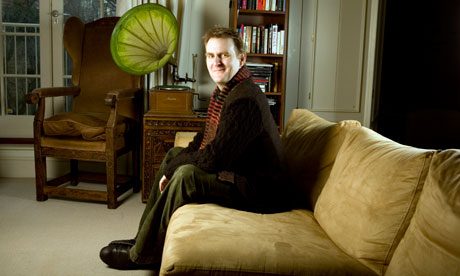
The author of two well-received science fiction novels, The Gone-Away World (2008) and Angelmaker (2012), Nick Harkaway (born 1972) is also an experienced technology commentator and blogger. The son of the novelist John Le Carré, he worked in the film industry for a decade before turning to novels. His first non-fiction book, The Blind Giant: Being Human in a Digital World, is published by John Murray
How did you get into writing about technology?
In 2007 when my first novel, The Gone-Away World, was accepted, it was the time publishers were starting to talk about digital. I came from the movie business, which had been rocked by digital technology, and I thought: we've got to have an industry that does it right. Google Books was one thing going on then – this extraordinary project to produce a global digital library – and I thought it was really problematic. Because I was the guy who would give a soundbite, I ended up blogging about it. And the thing about digital is, you can't limit yourself to one industry – it bleeds into everything.
Has the publishing industry been slow to respond?
They've been a bit leaden. It's not that they haven't taken on board the shift that's occurring, but some of the consequences haven't sunk in. There's a willingness to think: we'll let everyone else figure out how the market should work, and then we'll just supply books in the same way that we did to bookshops to electronic sellers like Amazon, Apple and Google. But booksellers are tied to publishing – they need conventional publishing models to continue – but for those companies that's not the case. Amazon is an infrastructure company; Apple sells hardware; Google is really an advertising company. You can't afford as a publisher to have those companies control your route to market.
One of the themes of your book is how people misunderstand the digital world…
There's this tendency to talk about it as if it's an alien, separate space. And it's not true. It's just an overlay. The danger is that we end up thinking of the internet as other, as a threat, or in terms of lawlessness, when it's just another layer of the world we inhabit.
But it's hard not to be freaked out by some things, no? You mention in the book that Google wants to transmit directly into our brains...
Yes, but we shouldn't be freaked out to the point that we deny that it exists. This sort of technology is already happening. Yet when people write about it in news reports, they will say things like "It sounds like science fiction but…" And no it's not!
Are there problems with how people behave online?
People are ruder. And we need to grow up about that. But an important part of the internet is that it provides a space for people whose identities are socially unacceptable. If it enables someone who feels minoritised to be who they want to be, it's actually worth having other people be offensive. I'd much rather have both than have neither.
Is there good fiction about the internet?
The mainstream of literary culture in the UK is very averse to writing about technology. There are sci-fi writers who are playing with interesting ideas but I haven't yet seen much that represents social media in a way that's both realistic and compelling. There are technical issues with writing about screens, though – it's hard to make them interesting.
How does publishing a non-fiction book compare with bringing out a novel?
It's really odd. Because you can be wrong. In a novel, even if you put a country in the wrong hemisphere, which I've done, I can always claim it was part of the additional weirdness of the story. But it's also great fun. It's much easier to get people to listen to your crazy, ridiculous opinions if you've written a book about them than if you've given them to a character in a novel.

